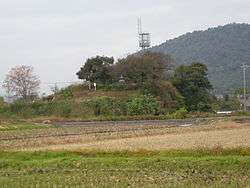Soga no Kurayamada no Ishikawa no Maro

Soga no Kurayamada no Ishikawa no Maro (蘇我倉山田石川麻呂) (ob. 649) was a member of the Soga clan and first holder of the office of udaijin (Minister of the Right).[2] He was the son of Soga no Kuramaro and grandson of Soga no Umako; his daughter was married to Prince Naka-no-Ōe. After the fall of Soga no Iruka, he was the most senior member of the family. As chronicled in the Nihon Shoki, he was accused of treason and strangled himself at Yamada-dera in 649; his wife and seven of his children also committed suicide; other relatives were captured and executed. The discovery of exonerating documents led to a posthumous pardon and the posting of his slanderer to Tsukushi Province. His death brought the political ascendancy of the Soga clan to an end.[3][4]
References
- ↑ 市指定文化財 [Municipal Cultural Properties] (in Japanese). Kakamigahara City. Retrieved 5 June 2012.
- ↑ Brown, Delmer M., ed. (1993). The Cambridge History of Japan I: Ancient Japan. Cambridge University Press. pp. 190–3. ISBN 0-521-22352-0.
- ↑ Aston, W.G (1896). Nihongi: Chronicles of Japan from the Earliest Times to AD 697. Tuttle. pp. 232–5. ISBN 0-8048-0984-4.
- ↑ Parent, Mary Neighbour (1984). "Yamadadera: Tragedy and Triumph". Monumenta Nipponica. Sophia University. 39 (3): 307–311. doi:10.2307/2384596. JSTOR 2384596.